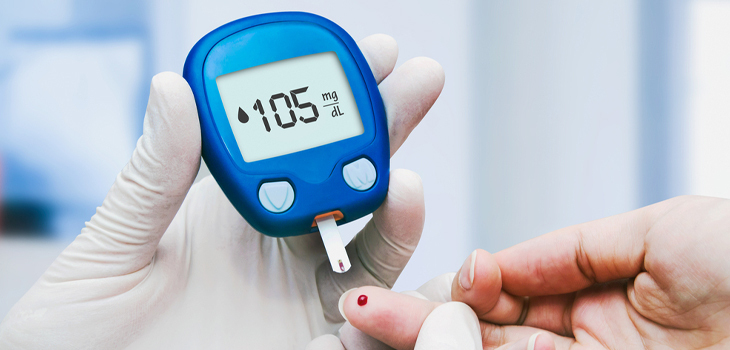Diabetes in the Elderly: A Comprehensive Approach
Diabetes is a serious disease that is one of the most serious health issues in the world today. According to the World Health Organization, diabetes will be the 7th leading cause of death globally by 2030. The number of people affected with diabetes grows significantly each year as the population grows, and the most diagnosed age groups for diabetes are also older adults. If you already have diabetes, you can take steps to manage it and avoid diabetes-related health complications. The very first task in tackling diabetes is to educate yourself about what it is, how it can be prevented, and how to treat it.
What is Diabetes?
Diabetes is a metabolic disorder that tends to affect how the body processes energy from food. Our bodies convert a large portion of the food we consume into glucose, a type of sugar that provides us with energy. If you are diagnosed with diabetes, it means that your body has trouble processing the sugars in your food. In such cases, your blood will progressively accumulate more glucose (blood sugar), causing its levels to rise to dangerously high levels. Having too much sugar in your blood can eventually be harmful to your health and affect your overall lifestyle, from your activity level to your diet.
Insulin is the enzyme that breaks down sugar in the body. Insulin is secreted by the pancreas and then released into the bloodstream, where it aids in the absorption of glucose, the conversion of glucose to energy, and the maintenance of normal blood sugar levels. If you have diabetes, your body may not produce enough insulin, or it may not use insulin correctly.
Insulin resistance is the precursor to type 2 diabetes and occurs when your body does not use insulin properly. Sometimes your body does not produce insulin at all, which is the primary cause of type 1 diabetes. Also, there are types of diabetes that develop at an early age (for instance, gestational diabetes develops in expectant mothers), but presently we’ll look at how diabetes affects your health as you get older. That’s why simply stating that you have diabetes does not provide a complete picture of your symptoms.

What is Prediabetes?
When you are diagnosed with prediabetes, it means that the blood sugar is high, but not consistently high enough to be regarded as type 2 diabetes. It still does, however, imply that you must act immediately to counteract it. Once you have prediabetes, your body will either gradually reject insulin as a means of breaking sugar into energy, or it soon will.
Causes
Prediabetes is just a condition that develops over time, that also means that lifestyle choices, in conjunction with a family history, play a role in developing prediabetes and, eventually into full-blown diabetes. As prediabetes is the first step toward developing type 2 diabetes, the causes of Type 2 diabetes are strikingly similar. Some of the more specific causes of prediabetes are as follows:
- Sedentariness
- Genetics
- Sleeping Habits
- Obesity
- Metabolic Syndrome
Prevention
Type 1 Diabetes cannot be prevented only managed however there are things you can do if you have prediabetes to prevent or delay the onset of type 2 diabetes. Losing Weight may prove to be beneficial. Healthy Eating and Physical Activity can make a significant difference. Consult a doctor to develop a plan to help you make healthier choices and workout on a daily basis. Get help giving up smoking (if you smoke), since smokers are much more susceptible to developing type 2 diabetes than nonsmokers. Make sure to inquire about how frequently your glucose levels should be checked. Your physician may also discuss with you the possibility of taking medicine to prevent or delay type 2 diabetes.
Types of Diabetes
Diabetes is classified into two major types.
Type 1 Diabetes is instigated by the body’s inability to produce insulin. Although this type of diabetes can develop in the elderly, it is most prevalently reported in children’s and adolescent’s, who will have diabetes for their entire lives.
Symptoms
Type 1 diabetes warning signs include:
- Bedwetting And Frequent Urination
- Heightened Thirst and Appetite
- Mood Swings
- Hazy Vision
- Fatigue
- Loss Of Weight
Type 2 Diabetes occurs when the body’s ability to produce and use insulin is impaired. It is most prevalent in middle-aged and elderly people, but it can also affect children. If you are obese, inactive, or have a history of diabetes in your family, you are more likely to develop type 2 diabetes. Women who have had gestational diabetes (a type of diabetes that develops during pregnancy) are more likely to develop type 2 diabetes later on in life.
Symptoms
Unlike with type 1 diabetes, who typically experience symptoms of their diabetes fairly quickly, those with type 2 diabetes are more likely to experience symptoms gradually as blood glucose levels rise to dangerous levels over a lifetime. The symptoms are similar for both types of diabetes as it is caused by a failure to properly process glucose from the bloodstream. Those are as follows:
- Frequent urge or need to urinate
- Extreme thirst or appetite
- Fatigue
- Blurry vision
Diabetes of either type can have a wide-ranging impact on your body. It must be controlled because it can lead to serious health complications such as heart disease, stroke, kidney problems, loss of vision, nerve damage, non-healing ulcers which can eventually lead to an amputation. In addition, individuals with type 2 diabetes are more susceptible to cancer and Alzheimer’s disease. Usually, a family doctor will work directly with you to oversee your diabetes or will recommend you to an endocrinologist, a doctor who specializes in diabetes care.
Tests for diabetes
Bring it up with your doctor if you suspect you have diabetes. When you go in for an appointment, your doctor will usually keep an eye on your blood sugar levels, and if they realize anything out of the ordinary, they will recommend that you get tested. Your primary care physician may perform a variety of tests to confirm a diagnosis, including repeating one test or attempting multiple tests. Among these tests are:
Fasting Plasma Glucose Test — Taken After Fasting for At Least 8 Hours
The fasting plasma glucose (FPG) test, also referred to as the fasting blood glucose (FBG) test or fasting blood sugar test. It measures glucose levels in the blood. The test is a comparatively straightforward, accurate, and low-cost test used to screen for diabetes that identifies issues with insulin activity.
It is based on the fact that fasting for an extended period of time causes the pancreas to produce glucagon, which causes the liver to release glucose (blood sugar) into the bloodstream.
In the absence of diabetes, the body responds by producing insulin, which keeps blood sugar levels stable (high blood sugar). However, fasting blood sugar levels will remain high if the body does not produce enough insulin or does not respond appropriately to insulin. The FPG test is typically recommended as a screening test for individuals over the age of 45, with the test suggested to be repeated every three years.
Random Plasma Glucose (RPG) Test — Given During Any Time All Through the Day
This test determines how much sugar/glucose is circulating in your bloodstream. The terms “random” or “casual” merely refer to the fact that the blood gets drawn at a laboratory at whichever time. The test is unaffected by whether you have fasted or eaten recently. A Random Plasma Glucose Test result of 200 milligrams per deciliter (mg/dl) or higher indicates that you may have diabetes. However, in order to obtain a more accurate result, the lab results must be validated by taking another random test, an FPG test, or an oral glucose tolerance test on a different day.
A1C Test — Given at Any Time Throughout the Day
This test examines your average blood sugar levels over the previous 3 months, allowing doctors to ascertain whether your existing high blood glucose levels are due to diabetes or if they are a trend. This test is most frequently used to identify whether a person has Prediabetes or Type 2 diabetes. There is no need to fast prior to actually taking this test, and can be completed simply by taking a blood sample. The test results are reported as a percentage, and the higher the percentage, the higher your blood sugar levels are. A normal percentage is below 5.7 percent while levels between 5.7 and 6.5 are considered prediabetic. Diabetes is associated with levels above 6.5.
TREATMENT
Diabetes has no known cure. As previously discussed, there are preventative measures you can take in the prediabetic stage if detected in time. However, diabetes cases are generally treated differently depending on which type you have, due to your body’s distinct needs, blood sugar levels, and health effects caused by diabetic symptoms.
Type 1 Diabetes
Because the pancreas does not produce insulin, the primary method of treatment for type 1 diabetes is Insulin. There are 2 different ways to accomplish this:
Injections
This is done with a needle or an insulin pen.
Pumps
When attached to your body, the pump can slowly or rapidly introduce insulin without requiring you to inject yourself.
Type 2 Diabetes
The first step in treating type 2 diabetes is to improve your lifestyle and eating habits. There are also medical treatments that can help control blood sugar levels. These are some examples:
ANTIDIABETIC DRUGS
Based on your Sugar level, Oral drugs will be advised and adjusted by your Physician / Endocrinologist.
INSULIN THERAPY
Some people with type 2 diabetes require assistance to get their insulin sensitivity back on course and working properly. This function, like type 1 diabetes, can be accomplished through injections or pumps. Your doctor will determine the type of insulin you require and how long you will require it.
Diabetes Management
When it is not possible to prevent diabetes, it can be managed according to your doctor’s recommendations to live a normal and longer life. This may necessitate changes in both your lifestyle and your medication. Diabetes treatment plans typically include the following components:
- Keeping track of glucose levels
- Making nutritious food choices
- Engaging in physical activity
- Taking the medication with zeal
Here are a few pointers on how to live a good life while living with diabetes:
- Control your blood pressure
- Maintain your cholesterol levels
- Quit smoking
- Test eye every year
- Get kidneys checked annually
- Get a flu shot and a pneumonia vaccine each year
- Maintain good oral and dental hygiene
- Always keep a close eye on your feet for any signs of abnormality

Conclusion
Diabetes has no known cure. If you are concerned about any of the symptoms of diabetes, you must see a doctor. It is best to start treatment as soon as possible because it will help with the management of this condition.
To learn more about the disease and possible treatments, contact Dr. Mehta’s Hospitals. Diabetes tests, prescription drugs, foot exams, vaccinations, eye exams, and nutrition counseling can all be done at our hospital.

